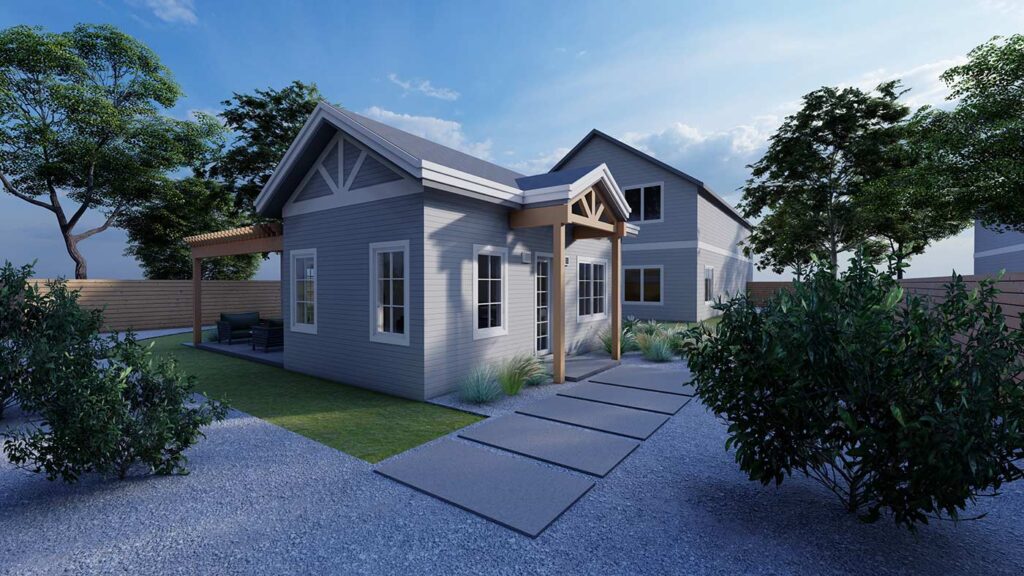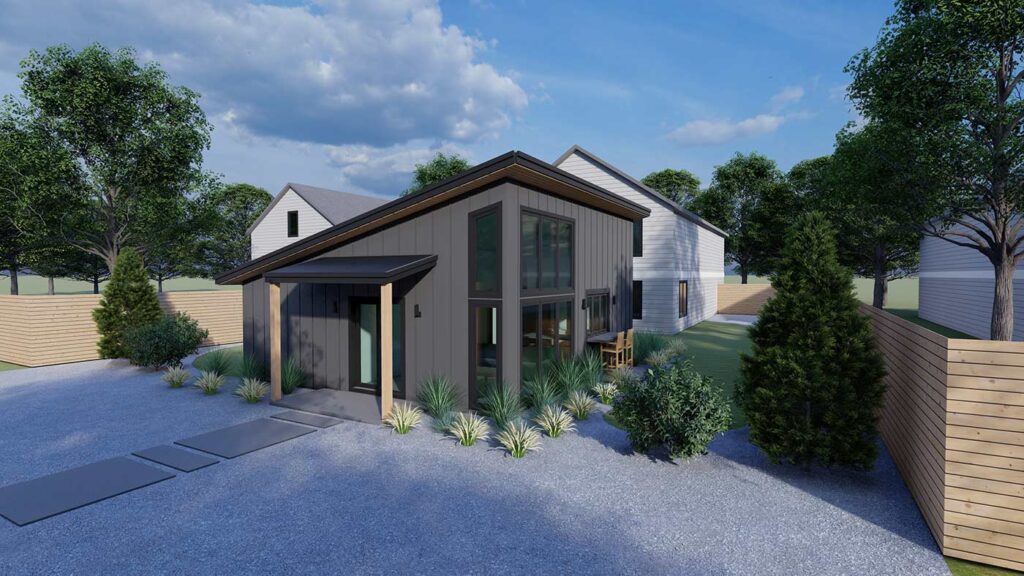The thought of having a tiny house is fun and exciting. Whether envisioning laid-back vacations and weekend getaways, opportunities to generate rental income, or simplified living in a smaller home, there are myriad reasons why a tiny house makes sense. However, bringing tiny home dreams to reality in Colorado requires a fair amount of due diligence to navigate the complexities of zoning laws, city requirements, and even HOA restrictions. As a local company based right here in Colorado, we specialize in building tiny homes and have all the insider details on where you can construct a tiny house in this beautiful state.
In this article we will cover:
- What factors determine if you can build a tiny house in Colorado
- What are the building laws and requirements for Colorado
- How to find tiny house zoning in Colorado
- Tiny house builders in Colorado

Where can you build a tiny house in Colorado?
What factors determine if I can build a tiny house?
There are several factors that determine where and how a tiny house can be built in Colorado. To further complicate matters, legislation around ADUs (accessory dwelling units or tiny homes on an existing residential property) is continually changing and evolving. For the sake of this article, we will consider the ability to add a tiny house as a permanent or mobile structure, and provide the guidelines that determine the feasibility of this type of dwelling.
- Colorado state law: There is no state law specifically governing tiny homes. Tiny homes are generally classified based on their characteristics- e.g. mobile or permanent. Mobile tiny homes, such as those on wheels, would be classified under RV regulations and permanent tiny homes, such as those on foundations, are classified under dwellings.
- County regulations and zoning: Each county has unique requirements for tiny homes pertaining to their classification and the type of use allowed. Tiny homes on wheels are generally classified as RVs and allowed to be used only for recreational purposes, however, laws recently changed and a tiny home on wheels that is tied to utilities and placed correctly can now be used as a permanent dwelling. Similarly, a tiny home on a permanent foundation can be considered a dwelling if county laws and building codes are adhered to and permanent utilities attached.
- HOA rules: HOA rules are some of the trickiest to navigate because there is so much variability in what is allowed for each neighborhood. A common requirement for building a home on a vacant residential lot is that it must meet a minimum size requirement; generally not smaller than 1000 square feet. Most HOAs do not allow tiny homes on wheels as residences with the exception of mobile home or RV parks.
What type of tiny home can I build?
The most common types of tiny homes fall under the categories of permanent or mobile.
Mobile – Tiny Homes on Wheels
Historically, a mobile tiny home on wheels has often been classified as an RV and restricted from use as a permanent residence. However, Colorado laws underwent significant changes with the passing of HB22-1242 in 2023. This legislation allows tiny homes on wheels built to the International Residential Code to be permanently resided in. While this alters the mobility of homes on wheels, it ultimately offers more flexible living options.
Permanent – Tiny Homes on Foundations
Tiny homes built on or attached to a foundation are deemed dwellings and recognized as permanent residences. Recent legislation has created greater flexibility to permit permanent tiny homes as secondary dwellings on existing residential lots (known as accessory dwelling units or ADUs) in most Colorado counties. The specific locations and sizes of tiny homes are typically determined by city zoning and HOA restrictions.

Colorado Tiny House Laws
When planning to build a tiny house, it’s crucial to thoroughly understand the requirements set by your county, city, and homeowners’ association (HOA). These regulations will determine the size, style, and location of your tiny home.
We’ve provided a high-level summary of Colorado Tiny House Laws for both Accessory Dwelling Units (ADUs) and Tiny Homes on Wheels. However, it’s essential to consult your local zoning ordinances for the most accurate and detailed information.
If interpreting these laws seems daunting, don’t hesitate to reach out to an experienced design-build firm like Little Home Builder. They have expertise in local Colorado ordinances and can guide you through the process.
Colorado Tiny House Laws for ADUs
When it comes to the laws governing Accessory Dwelling Units (ADUs) in Colorado, there are several factors to consider. These not only include where you can construct an ADU but also the characteristics of the building, such as its size, location on the property, and aesthetics. The laws also dictate the maximum occupancy and whether or not you can rent out the ADU.
While these regulations vary based on local zoning ordinances, we’ve provided an example from Denver County to illustrate what is typically allowed and how it’s determined:
- Zoning District: Denver provides clear guidelines around the zoning districts where ADUs (a secondary, tiny dwelling on a residential lot) are allowed. The zoning map can be found here.
- Building size: The tiny home size is dependent on the size of the residential lot and the existing building coverage. While there is no minimum size, generally a tiny home can’t be bigger than 1000 square feet for very large lots and 864 square feet for typical size lots. The building height is also restricted to 17-24 feet depending on the zone.
- Location: The location of the tiny house on the property is determined based on the setbacks (distance from neighboring properties, alleys or streets) as well as the location of the primary house.
- Occupancy: Zoning code requires owners of properties with an ADU to maintain permanent residency in either the primary or accessory dwelling unit.
- Materials/Style: In most residential districts, the ADU or tiny home will be required to closely match the architectural style of the existing home.
Colorado Tiny House Laws for THOW
Colorado permits the parking of tiny houses on wheels on private property, provided they adhere to local zoning laws. Alternatively, individuals can seek out communities or developments tailored for tiny homes, which often offer amenities and a supportive community. Renting land from private landowners or buying land in rural areas are also viable options. Thorough research and consultation with local authorities are essential to ensure compliance with all regulations and restrictions.
Tiny House Zoning Colorado
In general, Colorado is becoming more receptive to flexible housing options such as tiny homes; both permanent and mobile. Unfortunately, finding the right spot to park or build a tiny home will require a bit of research since regulations vary county to county.
For neighborhoods, the first place to start is with the HOA as it will ultimately have more specific rules and requirements than the city or county. If there is not an HOA, there is more flexibility, and the tiny house requirements will be determined by city and county zoning and building codes.
How to look up zoning
A good starting point in exploring the possibility of adding a tiny home to a property or parking a tiny home on wheels is to research the city zoning laws, which are usually available on your city planning website.
We can’t list all of Colorado’s city planning websites, but here are a few of the big ones:
- Denver zoning (plus our guide to ADUs in Denver)
- Colorado Springs zoning
- Boulder zoning
Conducting a simple search using terms like “adding an ADU in (city), Colorado” typically leads to the city planning website, which generally contains a wealth of information and resources.
Don’t have the time to look up your city planning website? Another option is to reach out to a design-build firm, such as Little Home Builder, that provides free consultations with professionals knowledgeable about Colorado zoning laws.
Colorado’s Little Home Builders
Whether you’re poised to break ground on your Colorado tiny home or just starting to navigate the intricacies of zoning laws, Little Home Builder is here to guide you every step of the way. As a locally-owned Colorado company and certified ADU Specialist, we’re your ideal partner in this journey. Start with a free consultation today and let’s turn your tiny home dream into reality or browse our list of the 7 best tiny house builders in Colorado.